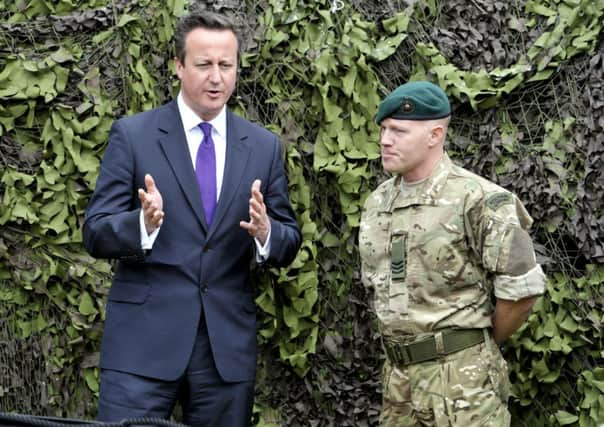Euan McColm: Start battle for hearts and minds


This was no more than we might have expected. The decapitation of Foley by a terrorist – likely to be a UK citizen – demanded a response from the top of the British Government. Surely, those who have so far seen (or purposely chosen to see) the activities of the self-styled Islamic State in the abstract, could no longer do so?
Some (including me) wondered if, after resisting demands for some weeks, Cameron might be about to recall parliament to discuss the British response to Islamic State fighters wreaking bloody mayhem in Syria and Iraq.
Advertisement
Hide AdAdvertisement
Hide AdBut, no. The Prime Minister remained in London for only 19 hours, during which time he held meetings and explained that the Government would do everything in its power to prevent more British citizens travelling to join Islamists, prepared to slaughter anyone who opposes their wish for a global caliphate.
It was something. But very far from enough.
Cameron’s response perpetuated the dangerous contemporary myth that the Islamic State presents a problem only to the Middle East. The Prime Minister failed to address the indisputable fact that IS terrorists are at war with us, here in the UK.
British citizens who travel to the Middle East to learn an extremist ideology, to train with terrorists, and then to kill those – of all faiths, including Islam – who reject their twisted code are not, somehow, no longer a danger to us. It would be naive to think some will not return, bringing this war to our shores. The cliché is true: they hate us, they hate our way of life, and, for these reasons, they would rejoice in killing us.
Casting a black shadow over the debate on this – or any issue where military intervention might be considered a possible response – is the 2003 invasion of Iraq. Britain’s involvement in that conflict does more than inform current foreign policy, it paralyses it.
Almost by consensus, that military venture was a disaster. Politicians of all parties are wary of being the next to make a military call that turns out to be wrong.
Last year, Labour leader Ed Miliband led parliamentary opposition to any military intervention in Syria, where President Assad had ordered the use of chemical weapons against those opposing his regime. Miliband’s decision appeared to have been based on his consideration of the electoral price Labour paid for the Iraq invasion rather than any analysis of the horror unfolding in Syria even as MPs were lining up to support his “leave them to it” approach.
That same unease about military intervention hangs heavy over any discussion about responding to IS terrorism.
A popular trope in such debates is that Britain has played its part in the creation of this dark vein of Islamic extremism. UK foreign policy, goes this analysis, inevitably bred extremism. We are reaping now what was sown in 2003.
Advertisement
Hide AdAdvertisement
Hide AdIt is possible to pick flaws in that argument. For one thing, the rise of Islamic extremism predates the action of 11 years ago.
But let us say that those who offer this explanation are completely correct. Let us, for the sake of argument, agree that Britain is largely to blame for this new wave of jihadist terror.
If this is the case, though, the question is “so what”?
Whether Britain played a part or not in creating the IS monster, it now exists and no amount of hand-wringing about past British interventions can change that. No amount of I-told-you-so absolves us from serious consideration of all options, including military ones.
So far, British forces have been involved in dropping aid parcels to refugees fleeing IS killers. There was also agreement to participate in a mission to rescue Yazidi people from Iraq’s Sinjar mountains.
These have been carefully described by the Prime Minister as humanitarian missions, though any rescue which involved British troops on the ground where IS fighters were attacking might surely be considered to be military in nature. The ground has shifted, already.
Opposition to the 2003 invasion of Iraq was widespread and heartfelt, so it’s perfectly understandable that politicians take heed. But they must not use it now to excuse themselves from debating the possibility of action.
MPs must be given the opportunity to discuss what more is to be done – if anything – about the actions of IS.
We have watched as these jihadists buried children alive, placed the heads of their enemies on spikes, and this week murdered James Foley. Yet there still remains a caution about even discussing a serious response.
Advertisement
Hide AdAdvertisement
Hide AdThe Prime Minister should recall parliament now. Under consideration must not only be the ways in which the United Kingdom can help those now being hunted down by IS killers, but how we respond to a threat that will only come closer to home.
Perhaps the will of parliament will be that Britain remains on the sidelines, leaving the US to carry out bombing missions. The time has come, however, for this discussion to be had.
Cameron will find that any future change of tack by the Government will be easier to achieve if the debate begins to play out in public now.
Opponents to action will continue to warn that any military action will lead to an increase in radicalisation. But those who fear that engagement might lead to years of trouble must consider that IS is committed to its cause, regardless. It is committed to spreading its message worldwide. We face decades of war with IS terrorists, regardless of whether British forces drop a single bomb or not.
Islamic State jihadists will not stop unless somebody stops them or they achieve their aims. Given that the latter is unthinkable, perhaps it is a question of when, rather than if, British military forces take a role. «
Twitter: @euanmccolm